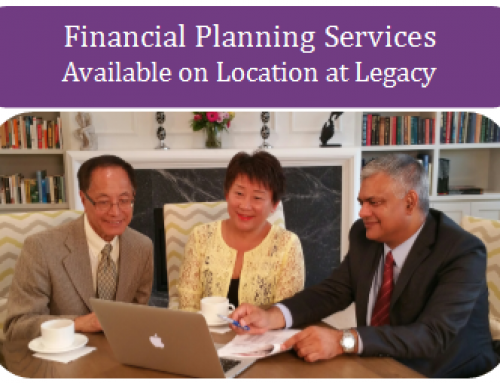HOW DO YOU KNOW WHEN IS THE RIGHT TIME TO TALK WITH YOUR PARENTS?
Stephanie Chan, Lifestyle Transition Advisor provides advice on talking to your parents about lifestyle options. WATCH VIDEO
We all want the best quality of life possible for our parents in their elder years. In order to achieve this, some planning must take place ahead of time in order to avoid a crisis.
A health crisis can occur from a number of unexpected incidents – for example, a fall, a stroke, or a serious medical diagnosis. If you find yourself in a crisis and you haven’t had any prior discussions about what your parents’ wishes are, you and your family may find yourselves in a panic and making unnecessary compromises.
The best time to start the conversation is when there is no pressure. Have your first discussion early when nothing has happened yet to make it a crisis situation.
Starting the conversation early will allow for several things:
1. In a family of multiple siblings, it will allow everyone including your parents to come to the table, voice their opinions and feel like they have an opportunity to be heard. You’ll have time to have family meetings and multiple discussions, all progressing towards the ultimate decision.
2. Your parent will have time to really think through what they would want for themselves. Help them by doing some research and presenting them with some options for their consideration.
3. You’ll have time to talk to others who you know have gone through the same thing with their own parents and get tips from them on how they handled the experience.
What if your parent just isn’t willing to have the conversation?
Resistance is the most common response that family members are faced with. If you find that you’re just hitting a wall each time you try to bring it up, give it a rest. Think about whether there are other related topics that should be discussed, such as:
1. Where the important documents are in the house in case of emergency?
2. Have they recently updated their will?
3. How are they doing with handling home maintenance tasks?
4. Are there any home improvements that they’d like some help with? Maybe improved lighting in the stairwells, hand rails in the bathroom, etc.?
Behaviours to avoid:
Try to avoid telling your parent what they should do. Instead, show them the options and guide them in making their own decisions. For example, if you are wanting them to be open to downsizing into a retirement community, you could show them what options they have by taking them on a few tours of possible seniors residences. Many of them offer trial stays of anywhere from 2 to 7 days so your parent could pack a suitcase and try out a furnished room in a retirement community without any future commitment. Make it clear that you’re there to support them in making whatever decision they feel is right for them.
The best way to avoid crisis is to talk about things and plan before something unexpected happens. Prepare yourself for some research and open discussions, and most importantly make it clear to your parents that you are there to help them make the best informed decision.
Stephanie Chan, Lifestyle Transition Advisor and Owner of Home to Home Advisory Services Inc.
For those who are moving, Home to Home can help the senior adults assess and select the ideal seniors residence, as well as plan and manage all aspects of the downsize and move, whether that be to a seniors residence or an independent house or condo. Legacy is pleased to have Stephanie as one of our downsizing and moving preferred partners.
If you would like to find out more about the partner services we provide, contact Kathleen, our Legacy Resident Advisor at 604.240.8550













